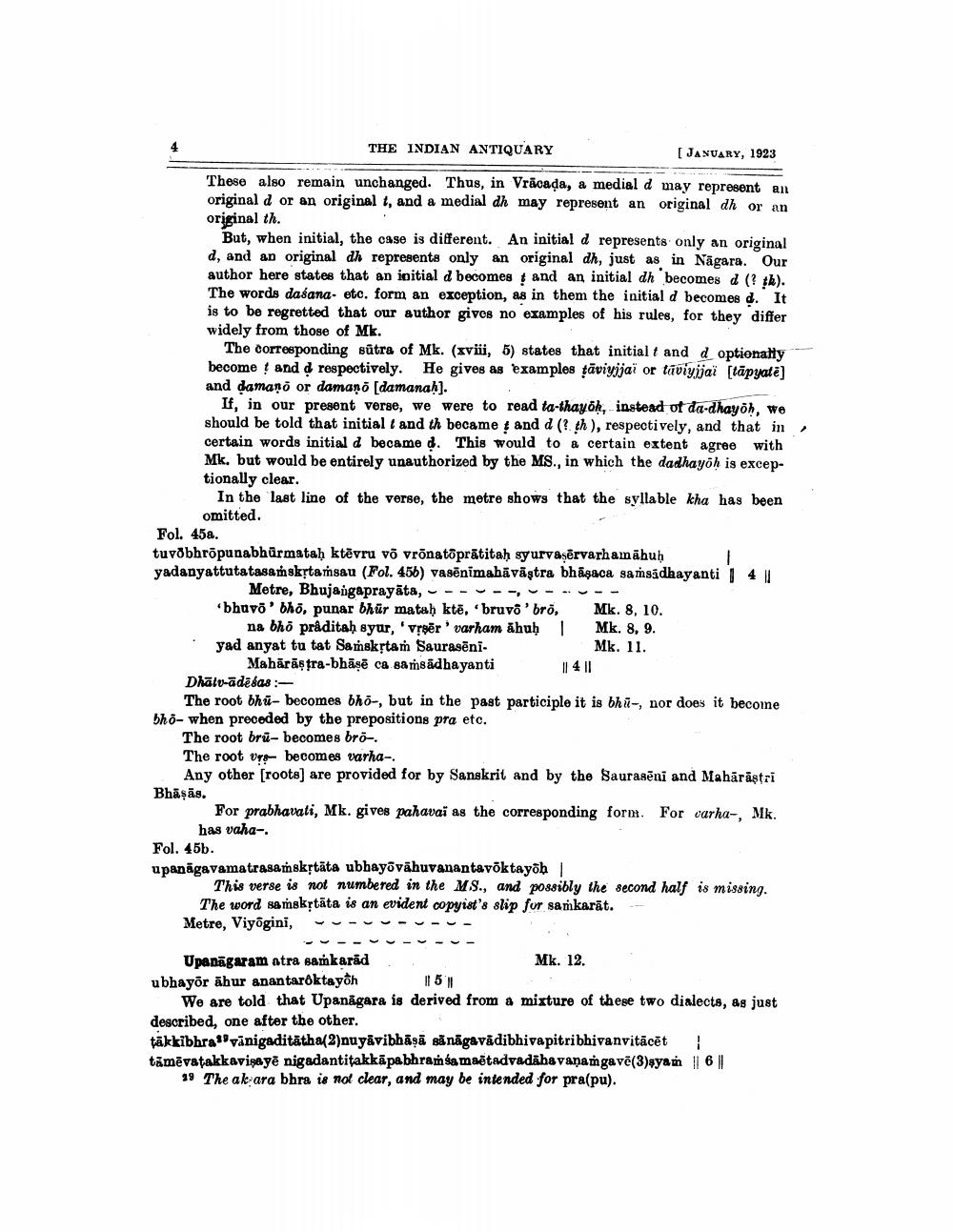________________
THE INDIAN ANTIQUARY
[ JANUARY, 1923
,
These also remain unchanged. Thus, in Vrioada, a medial d may represent an original d or an original t, and a medial dh may represent an original dh or an original th.
But, when initial, the case is different. An initial d represents only an original d, and an original dh represents only an original dh, just as in Nagara. Our author here states that an initial d becomes and an initial dh becomes d (? k). The words daśana- etc. form an exception, as in them the initial d becomes d. It is to be regretted that our author gives no examples of his rules, for they differ widely from those of Mk.
The corresponding sâtra of Mk. (xviii, 5) states that initialt and d optionally become ! and d respectively. He gives as examples tāvivijaï or tiiviyijai (tāpyatē] and damano or damano (damanah).
If, in our present verse, we were to read ta-thayõk, instead of da-dhayoh, we should be told that initial i and th became and a (? th), respectively, and that in certain words initial d became d. This would to a certain extent agree with Mk. but would be entirely unauthorized by the MS., in which the dadhayoh is exceptionally clear.
In the last line of the verse, the metre shows that the syllable kha has been
omitted. Fol. 45a. tuyobhröpanabhurmata ktèvru võ vrönetöprātitah syurvayễrvarhamhuh yadanyattutatasamskytaṁsau (Fol. 456) vasēnimahāvästra bh Asaca samsadhayanti | 4 |
Metre, Bhujangaprayāta, --- -- --- -- bhavo' bho, punar bhür matah ktē, bruvo 'bro, Mk. 8, 10.
na bho práditah syur, 'vrsēr varham āhuht Mk. 8, 9. yad anyat tu tat Samskytań Saurasēni.
Mk. 11. Mahārāßtra-bhāsē ca samsādhayanti Dhātv-ādēšas -
The root bhu- becomes bho-, but in the past participle it is bhu-, nor does it become bho- when preceded by the prepositions pra etc.
The root brü-becomes broThe root vro becomes varha-.
Any other [roots) are provided for by Sanskrit and by the Saurasēni and Mahārāştri Bhāṣās.
For prabhavati, Mk. gives pahavai as the corresponding form. For varha-, Mk.
has vahaFol. 45b. upanagavamatrasaṁskstāta ubbayövähuvanantavöktayoh
This verse is not numbered in the MS., and possibly the second half is missing. The word sanskrtāta is an evident copyist's slip for sankarāt. Metre, Viyogini, - - - -
Upanāgaram atra sankarad
Mk. 12. ubhayor āhur anantarøktayoh
We are told that Upanagara is derived from a mixture of these two dialects, as just described, one after the other. tākkibhrat'vānigaditātha(2)nuyävibhāṣā sināgavādibhivapitribhivanvitācēt tāmēvatakkavirayê nigadantitakkāpabhramsa maētadvadāhavanaṁgavē(3)ạyaṁ | 6
19 The ak ara bhra is not clear, and may be intended for pra(pu).




